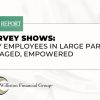

In the recent article, “Special Report: Real Estate Coaching’s Payoff,” poll respondents “often cited ‘fear’ as the biggest weakness their coach has helped them addresses.”
In life, we experience two kinds of fear: real fear and psychological fear. Or, as we prefer to think of the latter, “ego-fear.” Eckhart Tolle calls it “the voice in the head.” Try to become aware of that voice. Listen and notice thoughts that make you feel skeptical, distrustful or fearful. Once you start paying attention, you will begin to notice when these ego-based fears are manifesting. When the ego fear is in the driver’s seat, you are essentially allowing a filter to come between you and your intentions — but there is a way to overcome this subconscious filter and to eliminate fear from influencing the decisions that determine your actions — and ultimately success — in your life. It starts with a true understanding of ego-based fear.
Consider the difference between real fear and psychological fear or ego fear. What we call “real” fear is the body’s natural response to a threat. Feeling fear is an unavoidable natural response. In normal life, we experience fear so infrequently that we will do things like ride roller coasters and watch scary movies just so we can remember what fear feels like! Real fear is what you feel in a literally life-threatening situation, like narrowly missing a major car accident. Your body instinctively knows how to respond to a threatening situation, thanks to thousands of years of evolutionary history. You know it as the “fight or flight” reflex. For as long as you live, you will occasionally find yourself in circumstances that necessitate an involuntary, automatic response to a real threat. This is normal and natural.
Psychological fear is something entirely different — this ego-based fear is what holds most of us back. It’s the fear of shame or feeling embarrassed. Typical things agents feel fear about include contacting their center of influence, listing homes or other activities where agents are afraid of hearing the word “no” and of feeling rejection.
Whenever fear ceases to be real fear and becomes psychological, it becomes ego-driven fear. As the voice in the head gets going, it’s prone to make a story out of the event, develop an attitude and opinion about it, and relive it in countless ways. This remembrance manifests as anger, complaints, comments and negativity. The longer the ego thinks about the incident, talks to itself about it, shapes a victim identity around it and fashions it into a story to tell to others, the more personal the story becomes and the more anxious and offended the ego feels.
Psychological fear is unnatural — it’s not based on a real threat. You will never overcome real fear, nor should you. If a T-Rex is trying to eat you and your family, your hard-wired real fear response will keep you from becoming human jerky. Ego-based fear, however, can be overcome, if living from a place of peace and tranquility is your desire. And who does not desire peace and tranquility?
Here are the five most important ways to overcome fear:
1. Know the difference. Be aware of what you’re feeling — what triggered the physical and mental or emotional response — and make the distinction between the trigger situation and the fear or anxiety you are feeling.
2. Recognize fear in its other guise: worry. This is the twin sister of fear, and although it may seem a little more socially acceptable, it is also entirely ego-based … and no less toxic, either. Worry is fear talking to itself, and it moves in one of two directions: either toward the past or the future. That’s because worry feeds off memory (the past) and anticipation (the future). Neither of which, I might add, is real. Only what is now is real. So pay attention to the mental conversation you have around any fear you feel, and when it begins to morph into worry — as all ego fear eventually does – you can better handle it.
3. Pay attention to the mental noise that typically begins with “my.” Ego-fear and worry both concern themselves with the stuff that happened in “my life,” (or didn’t happen, should have or shouldn’t have happened, and so forth). Or it concerns itself with “my” future — what should happen or shouldn’t happen, what might happen or could happen, and so on. “My” may make you feel empowered in the moment, but eventually “my” is isolating. It cuts you off from a collective spirit of support, abundance and generosity. Yet this is how most people live their lives almost continually. So when “my” arises, take a moment to listen to its surrounding statement. Is it charged with ego-fear and worry?
4. Observe your thoughts of fear and your physical reactions to them. Here is the key to overcoming fears: Do not fight them. Why? Because you can’t win! Don’t punish yourself either, thinking you’ll never rid yourself of fear. Instead, observe your fears. In the East, this exercise is known as “the witnessing presence.” When you observe the conversations in your head, as well as the emotional reactions to those conversations, you put a little distance between you (the real you) and the you who is upset (the ego self and the “voice in the head”). This distance creates a space of peace or what Zen Buddhists call “the space of no mind.” As you make a practice of observation, this space will widen and your state of mind will increasingly relax. Your fears will disappear, too!
5. Know that it takes practice. Relaxing your mind takes repeated effort. However, people who discipline themselves in this regard will know “the peace that passes all understanding,” as Saint Paul put it. Observing your fear is the dissolution of fear. It is that simple. I encourage you to practice these steps, over and over again, and see for yourself what happens.
As real estate coaches, hearing agents describe fear as a major roadblock to success is a common occurrence, so we tackled this issue head-on in a special two-part series on our radio program, “Real Estate Coaching Radio.” (You can listen to part 1 and part 2 on our website.)
Tim and Julie Harris have over 20 years’ experience in real estate. Learn more about our real estate coaching and training programs at timandjulieharris.com, or tune in to Real Estate Coaching Radio every weekday at realestatecoachingradio.com.
The post 5 steps to overcoming fear in real estate appeared first on WFG National Title Insurance Company.





